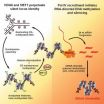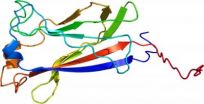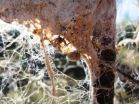(Press-News.org) BLOOMINGTON, Ind. -- Scientists at Indiana University have unlocked one of the mysteries of modern genetics: how acquired traits can be passed between generations in a process called epigenetic inheritance. The new work finds that cells don't know to silence some genes based on information hardwired into their DNA sequences, but recognize heritable chemical marks that are added to the genes. These chemical tags serve as a form of molecular memory, allowing cells to recognize the genes and remember to silence them again in each new generation.
The discovery made by a 12-member all-Indiana University team of scientists led by IU biologist and biochemist Craig Pikaard provides important new insight into how plant cells know to silence a genetic locus -- that specific place on a chromosome where a gene is located -- in every successive generation.
Rather than rely on intrinsic, DNA sequence-based information, the cells instead must recall the need to silence specific loci by relying on chemical marks displayed on the complex of DNA and proteins called chromatin. Addition, or removal, of one-carbon (methyl) or two-carbon (acetyl) chemical tags are ways of modifying chromatin that can impart additional, epigenetic (literally, "above genetic") information to a locus beyond the genetic information encoded in the DNA.
The ability to perpetuate chromatin marks serves as a form of epigenetic memory that confers what Pikaard calls silent locus identity, a pre-established state that is needed for the cell to deliver to the loci the machinery that actually accomplishes silencing in a multi-step process known as RNA-directed DNA methylation (RdDM). RdDM involves short-interfering RNAs (siRNA), tiny RNA molecules that are 24 nucleotides long and that guide the addition of methyl groups to matching DNA strands, ultimately rendering the genes inactive.
"Importantly, this work shows that silent locus identity is required for, but separable from, actual gene silencing," Pikaard said. "We've found that epigenetic inheritance is a two-step process, with the heritable specification of silent locus identity occurring before actual silencing of the locus can occur."
Scientists are interested in epigenetic inheritance because it's a process by which heritable modifications occur in gene function without changes in the base sequence of an organism's DNA being required. Disease states such as cancer, which occur sporadically during an individual's lifetime, are increasingly recognized as having an epigenetic basis.
Pikaard said the new work not only sheds important new light on the mechanisms responsible for epigenetic inheritance, a topic of broad interest in the fields of genetics and chromosome biology, but it also helps explain the basis for the recruitment of two plant-specific gene silencing enzymes -- the RNA polymerases Pol IV and Pol V -- first identified by Pikaard in 1999.
Specifically, the researchers tested and identified the relationship between histone deacetylase 6 (HDA6), an enzyme that removes acetyl groups from histones, and the CG DNA sequence maintenance methyltransferase, MET1, and discovered that their partnership in maintenance methylation can explain the perpetuation of epigenetic memory that accounts for silent locus identity.
"Collectively, our results show that silent locus identity is perpetuated from generation to generation through the actions of HDA6 and MET1," Pikaard said. "These activities are not sufficient to silence the loci but maintain a chromatin state that is required for Pol IV recruitment, siRNA biogenesis and RdDM, which is what ultimately silences the loci."
When the team removed the RdDM pathway in Pol IV and Pol V mutant strains of the model plant Arabidopsis thaliana (rockcress), all gene silencing was lost, but silent locus identity remained. They then removed the HDA6 and MET1-dependent process that specifies silent locus identity and, importantly, the epigenetic memory required for silent locus identity was lost and unable to be regained.
INFORMATION:The new work, "A two-step process for epigenetic inheritance in Arabidopsis," was published today, March 20, in Molecular Cell. Co-authors from IU included first author Todd Blevins, from IU's Department of Biology and Department of Molecular and Cellular Biochemistry, and affiliated with the Howard Hughes Medical Institute; Ross Cocklin and Chinmayi Chandrasekhara of the Department of Biology; Doug Rusch and Keithanne Mockaitis of the Center for Genomics and Bioinformatics at IU Bloomington; Frédéric Pontvianne, formerly from IU Biology and now at the University of Perpignan in France; Ram Podicheti and Haixu Tang from the Center for Genomics and Bioinformatics and the IU School of Informatics and Computing; and Satwica Yerneni and Chris Braun from the School of Informatics and Computing.
Pikaard is one of 15 national Howard Hughes Medical Institute and Gordon and Betty Moore Foundation Investigators selected in 2011 to receive approximately $5 million over five years to advance the study of plant biology. He is the Carlos O. Miller Professor of Plant Growth and Development in the IU College of Arts and Sciences' Department of Biology and Department of Molecular and Cellular Biochemistry.
Gene silencing instructions acquired through 'molecular memory' tags on chromatin
New work identifies machinery of epigenetic inheritance, relevant to development and cancer
2014-03-20
ELSE PRESS RELEASES FROM THIS DATE:
Study reveals a major mechanism driving kidney cancer progression
2014-03-20
The shortage of oxygen, or hypoxia, created when rapidly multiplying kidney cancer cells outgrow their local blood supply can accelerate tumor growth by causing a nuclear protein called SPOP—which normally suppresses tumor growth—to move out of the nucleus to the cytoplasm, where it has the opposite effect, promoting rapid proliferation.
In the March 20, 2014, issue of the journal Cancer Cell, researchers from Chicago and Beijing describe the mechanisms that enable hypoxia to cause the overexpression of SPOP. They show that hypoxia also stimulates the shuttling of SPOP ...
Passive acoustic monitoring reveals clues to minke whale calling behavior and movements
2014-03-20
Scientists using passive acoustic monitoring to track minke whales in the Northwest Atlantic have found clues in the individual calling behaviors and movements of this species. These findings, recently published online in the journal Behaviour, provide insight into one of the least studied baleen whales.
"Although we regularly observe minke whales in our Gulf of Maine surveys, we know very little about minke whale vocalizations and how they use sound in their behavioral and social interactions," said Denise Risch, lead author of the study and a marine mammal researcher ...
Size, personality matter in how Kalahari social spiders perform tasks
2014-03-20
At first glance, colonies of thousands of social spiders all look the same and are busy with the same tasks. Not so, says researchers Carl Keiser and Devin Jones of the University of Pittsburgh in the US, after carefully studying various gatherings of Stegodyphus dumicola social spiders of the Kalahari Desert in South Africa. The size and condition of a particular spider's body indicates which task it generally performs within a colony. In addition, neighboring colonies can have different "personalities" too, writes Keiser, lead author of a study published in Springer's ...
Swing voters hold more sway over candidates on economic issues
2014-03-20
CHAMPAIGN, Ill. — New research from two University of Illinois economics professors who study election trends analyzes how polarization on social issues affects competing candidates' economic platforms.
In the paper, co-authors Stefan Krasa and Mattias Polborn develop a theory of candidate competition that accounts for the influence of both economic and cultural issues on individual voting behavior.
"Many pundits and academics have argued that political polarization, particularly on social and cultural issues, has increased in the U.S.," said Polborn, also a professor ...
UTMB researchers discover a way to potentially slow down Alzheimer's
2014-03-20
Researchers at the University of Texas Medical Branch at Galveston have discovered a way to potentially halt the progression of dementia caused by accumulation of a protein known as tau.
Normally, tau protein is involved in microtubule formation, which acts as a brain cell's transportation system for carrying nutrients in and waste out. In the absence of tau protein, brain cells become dysfunctional and eventually die.
In many forms of dementia, such as Alzheimer's disease and chronic traumatic encephalopathy caused by multiple concussions, the tau protein starts behaving ...
What singing fruit flies can tell us about quick decisions
2014-03-20
You wouldn't hear the mating song of the male fruit fly as you reached for the infested bananas in your kitchen. Yet, the neural activity behind the insect's amorous call could help scientists understand how you made the quick decision to pull your hand back from the tiny swarm.
Male fruit flies base the pitch and tempo of their mating song on the movement and behavior of their desired female, Princeton University researchers have discovered. In the animal kingdom, lusty warblers such as birds typically have a mating song with a stereotyped pattern. A fruit fly's song, ...
As age-friendly technologies emerge, experts recommend policy changes
2014-03-20
From smart phones to smart cars, both public and private entities must consider the needs of older adults in order to help them optimize the use of new technologies, according to the latest issue of Public Policy & Aging Report (PP&AR), titled "Aging and Technology: The Promise and the Paradox." A total of eight articles all from authors affiliated with the Massachusetts Institute of Technology AgeLab are featured.
"Remarkable technological advances are all around us, and leaders in the business and scientific communities are keenly aware of 'the aging of America' and ...
A braking system for immune responses
2014-03-20
The surface of immune system cells is home to a number of receptors which are able to detect pathogens. As soon as these receptors are activated, inflammation occurs and the body's defense mechanisms kick in. Immune cells also have receptors that regulate or even suppress immunological responses to prevent damage to individual cells.
There are other immune receptors that recognize endogenous substances that are released when tissue damage or cell death occurs. As such, the organism can defend itself even in cases where the damage caused by the pathogen, but not the pathogen ...
(Not too) few but capable
2014-03-20
Until the '50s, bluefin tuna fishing was a thriving industry in Norway, second only to sardine fishing. Every year, bluefin tuna used to migrate from the eastern Mediterranean up to the Norwegian coasts. Suddenly, however, over no more than 4-5 years, the tuna never went back to Norway. In an attempt to solve this problem, Giancarlo De Luca from SISSA (the International School for Advanced Studies of Trieste) together with an international team of researchers (from the Centre for Theoretical Physics - ICTP – of Trieste and the Technical University of Denmark) started to ...
Inhibition of CDK4 might promote lymphoma development and progression
2014-03-20
COLUMBUS, Ohio – Anticancer agents that inhibit tumor growth by targeting a regulatory protein called CDK4 might actually promote the development and progression of certain B-cell lymphomas, according to a new study led by researchers at The Ohio State University Comprehensive Cancer Center – Arthur G. James Cancer Hospital and Richard J. Solove Research Institute (OSUCCC – James).
The study indicates that inhibiting CDK4, a regulator of the cell cycle, promotes genetic instability and the development or progression of B-cell lymphomas that are driven by the MYC oncogene.
The ...
LAST 30 PRESS RELEASES:
Machine learning reveals Raman signatures of liquid-like ion conduction in solid electrolytes
Children’s Hospital of Philadelphia researchers emphasize benefits and risks of generative AI at different stages of childhood development
Why conversation is more like a dance than an exchange of words
With Evo 2, AI can model and design the genetic code for all domains of life
Discovery of why only some early tumors survive could help catch and treat cancer at very earliest stages
Study reveals how gut bacteria and diet can reprogram fat to burn more energy
Mayo Clinic researchers link Parkinson's-related protein to faster Alzheimer's progression in women
Trends in metabolic and bariatric surgery use during the GLP-1 receptor agonist era
Loneliness, anxiety symptoms, depressive symptoms, and suicidal ideation in the all of us dataset
A decision-support system to personalize antidepressant treatment in major depressive disorder
Thunderstorms don’t just appear out of thin air - scientists' key finding to improve forecasting
Automated CT scan analysis could fast-track clinical assessments
New UNC Charlotte study reveals how just three molecules can launch gene-silencing condensates, organizing the epigenome and controlling stem cell differentiation
Oldest known bony fish fossils uncover early vertebrate evolution
High‑performance all‑solid‑state magnesium-air rechargeable battery enabled by metal-free nanoporous graphene
Improving data science education using interest‑matched examples and hands‑on data exercises
Sparkling water helps keep minds sharp during long esports sessions
Drone LiDAR surveys of abandoned roads reveal long-term debris supply driving debris-flow hazards
UGA Bioinformatics doctoral student selected for AIBS and SURA public policy fellowship
Gut microbiome connected with heart disease precursor
Nitrous oxide, a product of fertilizer use, may harm some soil bacteria
FAU lands $4.5M US Air Force T-1A Jayhawk flight simulator
SimTac: A physics-based simulator for vision-based tactile sensing with biomorphic structures
Preparing students to deal with ‘reality shock’ in the workplace
Researchers develop beating, 3D-printed heart model for surgical practice
Black soldier fly larvae show promise for safe organic waste removal
People with COPD commonly misuse medications
How periodontitis-linked bacteria accelerate osteoporosis-like bone loss through the gut
Understanding how cells take up and use isolated ‘powerhouses’ to restore energy function
Ten-point plan to deliver climate education unveiled by experts
[Press-News.org] Gene silencing instructions acquired through 'molecular memory' tags on chromatinNew work identifies machinery of epigenetic inheritance, relevant to development and cancer





